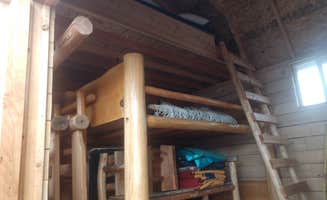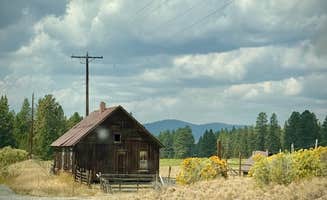Richland, Oregon provides access to multiple yurt camping options at elevations ranging from 4,000 to 7,000 feet throughout the Wallowa-Whitman National Forest. The region experiences dramatic seasonal temperature variations with summer highs reaching 90°F and winter lows dropping below freezing. Camping seasons typically run from late April through October with most yurt facilities closing during winter months due to heavy snowfall.
What to do
Fishing opportunities: The Snake River near Farewell Bend State Recreation Area offers emerald green waters stocked with trout. Campers report productive angling from shore or boat. "Many fisherman come here to enjoy the well stocked waters, keep an eye out for the other river wildlife commonly seen, rattle snakes," notes Brandon K.
Hiking trails: Multiple trailheads connect directly to Hurricane Creek Campground with routes ranging from easy creek-side walks to challenging wilderness paths. "Small campground by a beautiful but loud creek. Several sites along the creek, some accessible by car only (no trailer turnaround)," explains Janet K. The nearby Hurricane Creek Trail provides access to Eagle Cap Wilderness.
Wildlife viewing: Early mornings offer optimal wildlife spotting at Hurricane Creek Campground where deer frequently visit campsites. "Saw two bucks together early in the morning grazing," reports one camper. The creekside habitats support diverse bird populations including hummingbirds and water-dependent species.
What campers like
River access: Campsites along the water at Blackhorse Campground remain popular for their direct creek access. "The creek is right next to the sites and is great to sleep next to! The bathrooms were very clean and the sites were well-maintained and relatively private," notes Renae F. The sound of rushing water provides natural white noise that masks road sounds.
Natural spring water: The exceptional water quality at Fish Lake Campground comes from natural mountain springs. Visitors consistently mention the high-elevation water source as a highlight. "Nice restrooms and natural spring is plumbed in to the campground. Best water I have ever tasted," shares Patrick S.
Privacy between sites: Many campgrounds in the region offer good separation between camping areas. At Hurricane Creek Campground, "The sites are spaced quite far apart, some only large enough for a tent," according to Jim B. Blackhorse Campground similarly features "plenty of sites with a decent distance between them," as Andrew L. describes.
What you should know
Weather variability: High-elevation camping near Richland requires preparation for rapidly changing conditions even in summer. At Fish Lake Campground (6,990 ft elevation), temperatures can drop significantly overnight.
Road conditions: Access roads to remote camping areas may present challenges. "Before I drove down here, I'd read some reviews about the road not being pot-holed and washboard, but I decided to risk it with my van and so glad I did!" reports Kathy B. about Hurricane Creek.
Wildlife precautions: Bear activity occurs throughout the region. "Be bear aware here. Didn't see any bears, but they were around the week before I came," warns one Hurricane Creek visitor. Rattlesnakes also appear in riverside camping areas during summer months.
Limited facilities: Most remote campgrounds feature vault toilets without showers. At Catherine Creek State Park Campground, "While the toilet facilities are a bit older, they flush and are clean where it counts," explains Jeane L.
Tips for camping with families
Water safety: Fast-moving creeks require strict supervision of children. At Hurricane Creek, "River is fast. Keep an eye on your dogs!" advises Kathy B. The appropriately named Hurricane Creek moves quickly and presents drowning hazards.
Accessible options: Union Creek Campground offers developed facilities better suited for families with young children. "Our one-night stay at Union Creek Campground was very pleasant! The sites were perfectly spaced out, the restrooms were clean, and the scenery was beautiful!" reports Emma N.
Bug protection: Insect activity increases near water sources throughout summer. "Very many mosquitos, like swarms of them," warns Beth L. about riverside camping. Bringing appropriate repellent and protective clothing improves comfort during peak season.
Tips from RVers
Limited turnaround space: Many forest campgrounds have restricted maneuvering room. Hurricane Creek campsites include "some accessible by car only (no trailer turnaround)," according to Janet K. Larger rigs should research site-specific dimensions before arrival.
Leveling requirements: Uneven terrain at riverside sites often requires leveling equipment. As Kathy B. explains about Hurricane Creek, "Spent one night in that spot then took another closer to the river for the second night where I had to use my leveling blocks. But so worth it."
Water pressure considerations: At developed campgrounds with hookups, high water pressure may require regulators. "Great water pressure (about 100 psi) so we needed our regulator," notes one camper about a nearby RV park.



